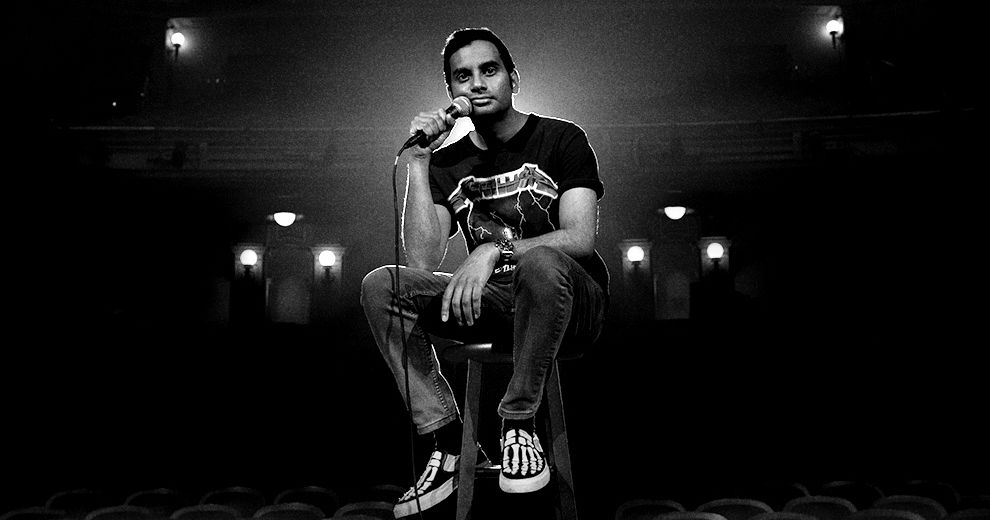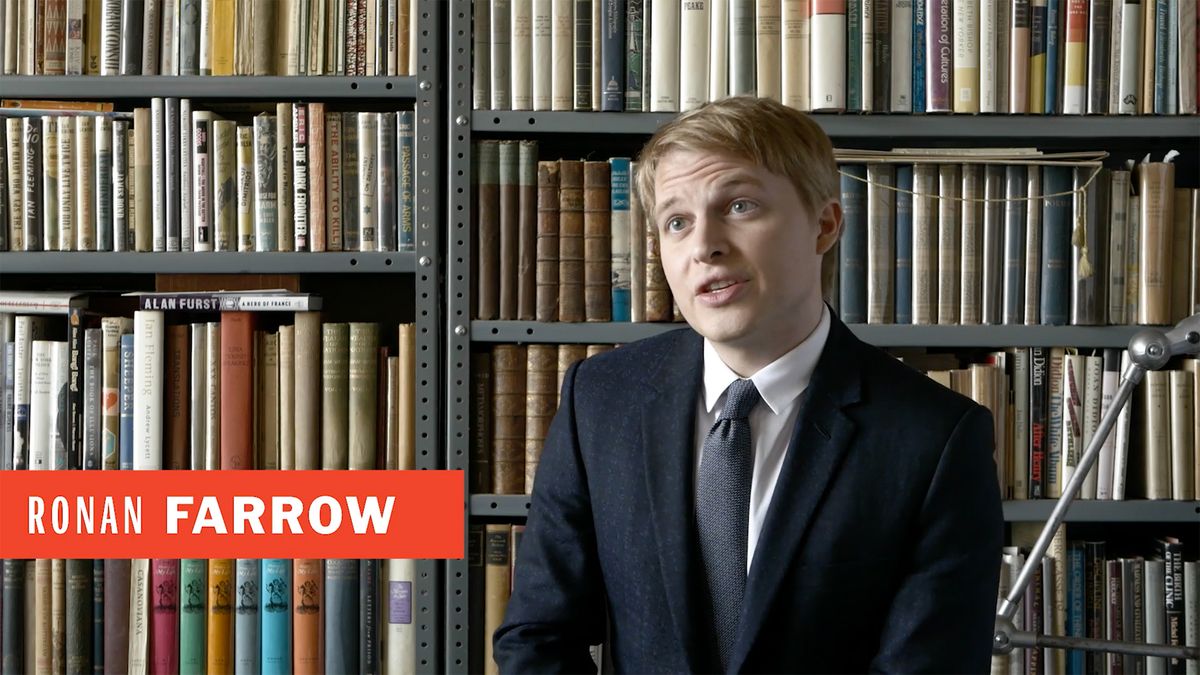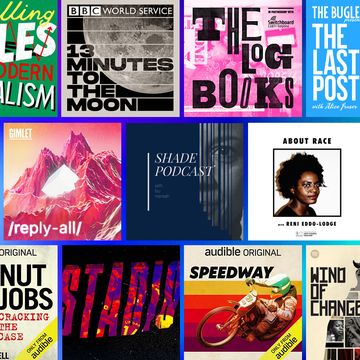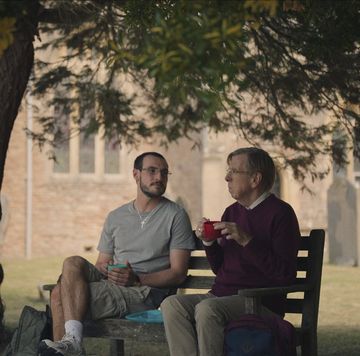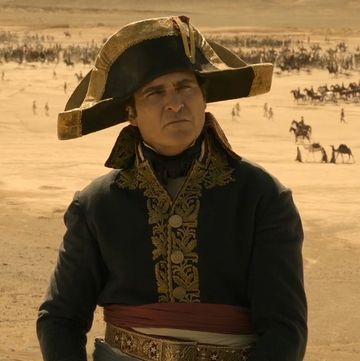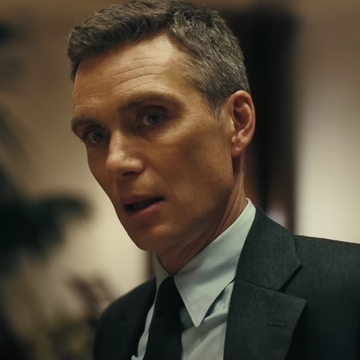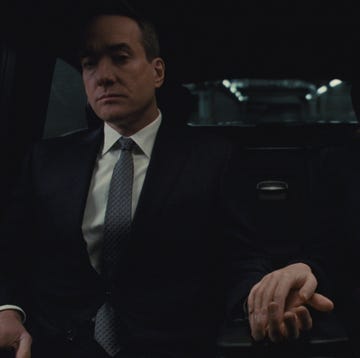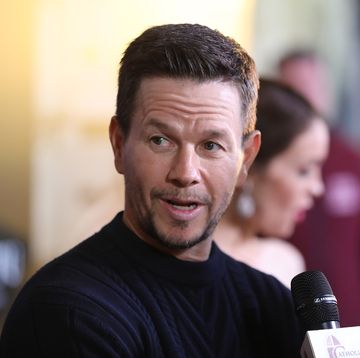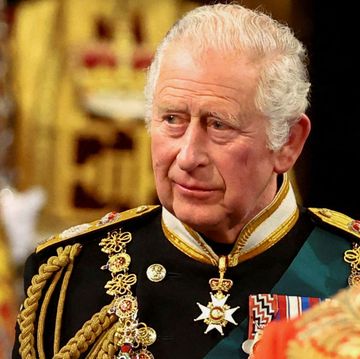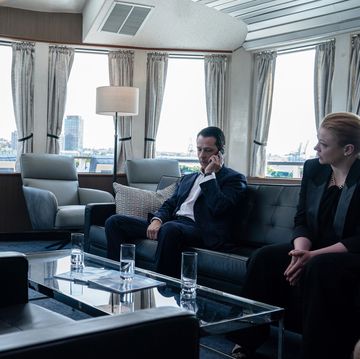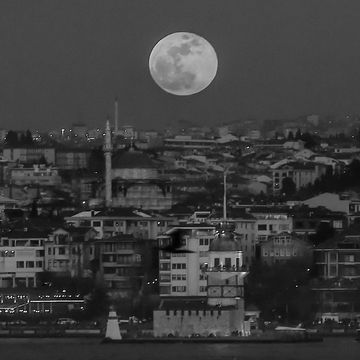Two years in, the stories of the Me Too era begin to blend together. The powerful men, the horrifying tales of rape and assault, the ever ballooning survivor counts. But the misconduct comic Aziz Ansari was accused of—relentlessly pursing and attempting to initiate sex with a woman even after she told him she didn’t want to have intercourse with him—was memorable not for being particularly horrifying, but for being horrifyingly mundane. And now, after a more than year-long absence from film and television, the comic has made his return to the national stage a with a new Spike-Jonze directed Netflix special, Right Now, which debuted Tuesday.
Using the pseudonym "Grace," a woman went public in 2018 with her account of a date she'd had with the comic. In it, she described Ansari as allegedly placing her hand on his penis “five to seven” times despite the fact that she kept pulling back, and said he followed her around his apartment as she tried to distance herself from him. Later, they exchanged text messages in which Grace told Ansari he’d "ignored clear non-verbal cues" and "kept going with advances." He apologised: “Clearly, I misread things in the moment and I’m truly sorry.”
The story instantly sparked a different kind of scandal than those caused by the other accounts of sexual misconduct. It didn't rise to the legal definition of assault, but Ansari, a self-described feminist and outspoken supporter of progressive politics, seemed to care only for the technical bounds of consent, pursuing his sexual goals with no concern at all for Grace's discomfort.
"That old Aziz who said, 'Oh treat yo’self,’" says Ansari near the end of Right Now. “He’s dead.” And the entire special seems designed to prove this true. The comic, who used to favour sharp suits, takes the stage a Metallica T-shirt and jeans. Before, he was an authority—the guy who literally wrote the book on modern love, always sharp in a suit and tie. Now, his outfit declares, he's not an oracle, but a work-in-progress, seeming both older and younger than we remember in his graphic t-shirt and more somber mien.
He addresses Grace’s story early on, and it provides fodder for one of the special's funniest and most honest-feeling jokes. After describing a fan who’s confused him for fellow Netflix star Hasan Minhaj, Ansari describes the guy "realis[ing] his mistake" and "trying to buy it back" by proving his familiarity with Ansari’s work. "Master of None?" the fan supposedly asked.
"Yeah yeah, that’s me," Ansari said.
"Parks and rec.” Yeah, yeah, that’s me.
"Treat yo’self?” Yeah yeah, that’s me.
“And, uh, you had that whole sexual misconduct thing last year?” No, no, no—that was Hassan.
The joking dodge feels a good deal more honest and less calculated than his somber statements about the encounter with Grace. "I’ve felt so many things in the last year or so,” he tells the crowed in a near whisper immediately after the Minhaj joke. "There’s times I felt scared, there’s times I felt humiliated, there’s times I felt embarrassed. And ultimately I just felt terrible that this person felt this way."
He continues:
And after a year or so, I just hope it was a step forward. It moved things forward for me, and made me think about a lot. I hope I’ve become a better person. And I always think about a conversation I had with one of my friends, where he was like, “You know what, man? That whole thing made me think about every date I’ve ever been on.” And I thought, “Wow. Well, that’s pretty incredible. It’s made not just me, but other people be more thoughtful, and that’s a good thing. And that’s how I feel about it.
While Ansari is right that Grace's story was remarkable for its ability to push the conversation around sexual misconduct beyond the black and white questions of consent, his on-stage remarks offered little in the way of clarity. How did the experience make him a better person? What did he do then that he wouldn't do now? He sounds contrite, but offers no apology for any particular action on his part—he's only sorry that Grace "felt that way." He spares a sentence for her feelings, and nearly a paragraph for his own. Overall, Ansari sounds as if he's recovering from a situation in which he was the main victim. Grace, meanwhile, had her real identity leaked after she shared her story, and became a target of online hate.
Over the course of the special, Ansari hits many more predictable-feeling beats. We’d do best in to live in the moment, he tells us, like his grandmother who, due to Alzheimer’s, has no other choice but to exist in a permanent present. And like Louis CK, who also briefly disappeared and has re-emerged since his own misconduct charges, during his short exile Ansari cooked up the scorching-hot take that call-out culture has, wait for it—gotten entirely out of hand.
For evidence, he cites the cultural appropriation flap surrounding a white teenager who wore a Chinese cheongsam to prom and sparked condemnation in some corners of the internet for lifting the garment from Chinese culture. Her offended classmate, says Ansari, “actually went up to her and they had a conversation. He explained his concerns about cultural appropriation, she assured him she was coming from a place of respect and admiration. And they both learned about each other’s perspectives. Just kidding, none of that shit happened!” Instead, the classmate took the issue to Twitter, where it snowballed into what Ansari describes as a show of woke one-upmanship. "I saw the pictures," he said of the girl, and "it didn’t seem like this person’s heart was in the wrong place."
It's hard not to hear echoes of Ansari's encounter with Grace in his insistence that the location of someone's heart is of more importance than the effects of their actions. But unlike many who decry PC-culture, Ansari still acknowledges that American culture as taken some necessary steps away from bigotry in recent years. Norms in entertainment, he observes, have changed rapidly. He points out thatThe Hangover, which was released just a decade ago, made casual use of the slur "f*ggot."
"I’ll give credit where credit is due: I’ve been around 36 years, I’ve never seen white people trying this hard to be nice to minorities,” he says. "I know there’s some people that are not trying at all, and some people going a bit aggressively the other direction. But overall, I’d say this edition of white people is trying the hardest. And I think it’s cool, and I appreciate it."
But despite his passing acknowledgment of the people “going a bit aggressively the other direction," his real problem seems to be with the aggressively woke. "Look, we’re all shitty people, okay?" he says later. "And we have our blind spots, and we become aware, and we slowly get better. We’re all on a journey. And if you’re sitting there, like, 'I’m not shitty. I’m aware of all the marginalised groups'—You’re extra shitty. Because you’re arrogant."
Ansari plays both sides, recognising the advances wrought by progressive cultural changes but always still embittered by his ignominious role in that change. He seems to envision a world of frictionless progress. Racism fades, but well-meaning people (and most of us do seem to largely mean well) are never confronted with the idea that their actions might be racist. We grow as a society, but experience no growing pains. Ansari appreciates the fact that slurs aren’t so often found in blockbusters films, that the white people he knows are attempting more than ever to treat people of colour with dignity. What he doesn’t reckon with is how this rapid evolution came about.
And while online activism has steep, steep limitations, the wokeness Ansari mocks probably has something to do with the progress he lauds. Call-out culture is imperfect engine of progress, but fear of being on the receiving end of it likely has something to do with the fact that Hollywood films are less homophobic than they were just a few years ago. But seems that these nuances—like those of his night with Grace—are something that Ansari would rather not tackle.
Gabrielle Bruney is a writer and editor for Esquire, where she focuses on politics and culture. She's based (and born and raised) in Brooklyn, New York.
